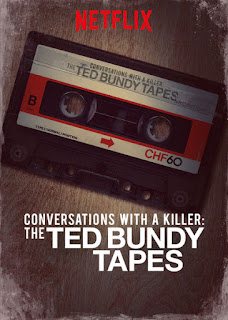4: 'Conversations with a Killer: The Ted Bundy Tapes'- Review/Thoughts
Netflix’s ‘Conversations with a Killer: The Ted Bundy Tapes’
documentary doesn’t really tell you anything new. We know what Bundy did; we
also know how psychopathic and narcistic he was in doing it. However, the
series does act as a blistering reminder of how he could get away with it and
how the tropes of a ‘serial killer’ have been wholly absorbed into our culture.
The actual monologues of Bundy (they can’t be called conversations
as there’s very little response from Michaud, the journalist interviewing him)
are undeniably interesting but not particularly illuminating. This is primarily
because Bundy takes control of the situation and shapes the recording to his own
desires: that is, making himself out to be much more “normal” and intelligent
than everyone else. However, when we hear how he discusses his actions in the
third person, it’s much easier to see how he manipulated others- he comes
across as a man acting at an intellectual remove from everything, when what he
describes is sado-masochistic sexual torture. The anger and aggression come
through only rarely, but when they do it is shocking and the viewer is suddenly
reminded that this articulate, engaging man brutally murdered upwards of 30
women. This is Bundy promoting himself and casting himself as a golden boy, to
the extent where he also defends himself in court because he believes himself
to be better than his defence. It feels as if he killed, at least in part, so
he could fulfil his dream of becoming a lawyer.
This golden boy image links to another documentary bubbling
beneath the surface of this one: one of constant police failings. This is
linked primarily to the difficulties of sharing information in a pre-digital
world, as a number of the featured police detectives mention, but also due to
the perception of Bundy as a bit of a scamp. His charm and good looks seem to
have manipulated nearly everyone, from the sheriff who laughs when he escapes
to the guards who see him as so harmless he’s able to make 2 escape attempts. Therefore
what comes across is a portrait of how belief in “upstanding citizens” prevent
criminals from being caught, and how social perceptions can easily blind people
to the truth.
However, the documentary doesn’t shy away from portraying Bundy
as a sick psychopath. Crime scene photos, whilst perhaps unnecessarily gruesome,
emphasise the human cost of his murders and contrast so totally with his
speeches on tape that the audience is never allowed to forget the gap between Bundy’s
perception of reality and the truth. In contrast the real kicker of the piece is
towards the end of episode 4, when we briefly hear a clip of Bundy describing
decapitating one of his victims and asking, softly, ‘can you hear me?’- the
viewer gets the sense that this was the true Bundy and is unnerved by the unemotional
qualities of his speech. Although these tapes must contain truly gruesome
events/phrases, it might have been more in the documentary’s interest to use
more of these, as the other tapes really only present Bundy’s narcissistic view
of himself, and so play to his overwhelming desire for attention and fame. These
other tapes reveal the truth, however hard it may be, preventing the glory and
admiration Ted Bundy clearly craved.
Nevertheless the documentary, along with the upcoming Zac
Efron-led biopic, can be seen as lauding Bundy as much as condemning him. Both
the documentary and the film seem to see his ability to escape and evade
capture as admirable if incredibly morally wrong- the film’s trailer in
particular focusing on Bundy as a kind of anti-hero and perhaps forgetting the
very real things he did. This might be partly
due to the length of time since the murders, but also suggest a very real problem
with the “true crime” genre- a tendency to be as hypnotised and drawn in by the
subject, preventing an objective critical gaze.
Therefore, whilst the documentary clearly portrays Bundy as depraved
and highlights how the authorities let him get away with it for so long, it
tends to fall too much in Bundy and his own voice, fulfilling his desire for
the limelight that was such an integral part of his crimes.



Comments
Post a Comment